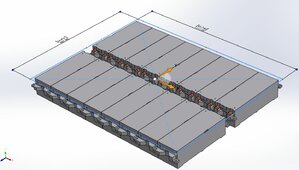Hi, I would like to extend the range of my Nissan Leaf in the winter. I'm thinking about a 8-12 kWh li-ion battery and an inverter in the trunk to charge 6-8 kWh while the EV is parked for a 3 - 4 hours in the area without a public charger. I can buy locally automotive quality li-ion modules from wrecked EV for a reasonable price. The modules are internally 6s2p. I plan to use them connected 2s2p or 2s3p, so 44V 200Ah or 44V 300Ah. I would like to use Victron Multiplus II 48/3000 as my inverter, because in the warm season, I would like to use the same Multiplus at home as an ESS addition to my solar system for power assist, peak shaving and higher self consumption. But I have a few doubts:
1. Is the Multiplus II rugged enough to be used in a car? I mean road bumps, vibration, temperatures outside between -20C and 20C(between -4F to 68F)? Can Multiplus be used in the trunk of the car, lying on the back? On the side? Or must stand upright only?
2. Will Multiplus II 48/3000 be able to charge my Leaf at 10A@230V? Or am I limited to 8A@230V only? According to the specifications, the Multiplus can deliver 3000VA, but only 2000W. What metric should I use for EV charging?
3. Is Multiplus II GX model preferable for ESS? I see listings, where Multiplus II GX costs only 40 eur($44) more than a standard version. On the other hand, if GX version does not add benefits for ESS, I could go for used one not GX version and save more.
Any sugestions are welcome, but I don't want to modify the high voltage battery/lines or change the car
Inverter does not have to be multiplus, or any of the victrons. But I would prefer EU brand, because far east products, that are not from the very bottom, are not that cheap here anymore and considering, that even more expensive ones come without any support or warranty, I dont' see much value in them generally, except maybe some special cases.
1. Is the Multiplus II rugged enough to be used in a car? I mean road bumps, vibration, temperatures outside between -20C and 20C(between -4F to 68F)? Can Multiplus be used in the trunk of the car, lying on the back? On the side? Or must stand upright only?
2. Will Multiplus II 48/3000 be able to charge my Leaf at 10A@230V? Or am I limited to 8A@230V only? According to the specifications, the Multiplus can deliver 3000VA, but only 2000W. What metric should I use for EV charging?
3. Is Multiplus II GX model preferable for ESS? I see listings, where Multiplus II GX costs only 40 eur($44) more than a standard version. On the other hand, if GX version does not add benefits for ESS, I could go for used one not GX version and save more.
Any sugestions are welcome, but I don't want to modify the high voltage battery/lines or change the car
Inverter does not have to be multiplus, or any of the victrons. But I would prefer EU brand, because far east products, that are not from the very bottom, are not that cheap here anymore and considering, that even more expensive ones come without any support or warranty, I dont' see much value in them generally, except maybe some special cases.



